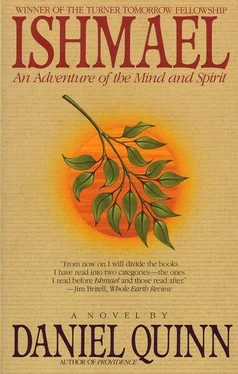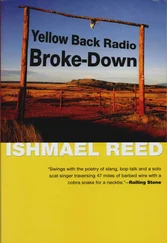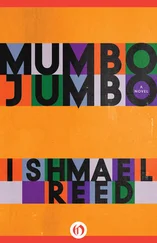“That of course is an inane idea,” Ishmael said. “The Leaver life–style isn’t about hunting and gathering, it’s about letting the rest of the community live—and agriculturalists can do that as well as hunter–gatherers.” He paused and shook his head. “What I’ve been at pains to give you is a new paradigm of human history. The Leaver life is not an antiquated thing that is ‘back there’ somewhere. Your task is not to reach back but to reach forward.”
“But to what? We can’t just walk away from our civilization the way the Hohokam did.”
“That’s certainly true. The Hohokam had another way of life waiting for them, but you must be inventive—if it’s worthwhile to you. If you care to survive.” He gave me a dull stare. “You’re an inventive people, aren’t you? You pride yourselves on that, don’t you?”
“Yes.”
“Then invent.”
“I have neglected one small point,” Ishmael said, then gave way to a long, groaning, wheezing sigh, as if he were sorry he’d allowed himself to be reminded of it.
I waited in silence.
“One of my students was an ex–convict. An armed robber, as it happened. Have I told you that?”
I said he hadn’t.
“I’m afraid our work together was more useful to me than to him. Primarily what I learned from him is that, contrary to the impression one receives from prison movies, the prison population is not at all an undifferentiated mass. As in the outside world, there are the rich and the poor, the powerful and the weak. And relatively speaking, the rich and the powerful live very well inside the prison—not as well as they do on the outside, of course, but much, much better than the poor and the weak. In fact, they can have very nearly anything they want, in terms of drugs, food, sex, and service.”
I cocked an eyebrow at him.
“You want to know what this has to do with anything,” he said with a nod. “It has this to do with anything: The world of the Takers is one vast prison, and except for a handful of Leavers scattered across the world, the entire human race is now inside that prison. During the last century every remaining Leaver people in North America was given a choice: to be exterminated or to accept imprisonment. Many chose imprisonment, but not many were actually capable of adjusting to prison life.”
“Yes, that seems to be the case.”
Ishmael fixed me with a drooping, moist eye. “Naturally a well–run prison must have a prison industry. I’m sure you see why.”
“Well… it helps to keep the inmates busy, I suppose. Takes their minds off the boredom and futility of their lives.”
“Yes. Can you name yours?”
“Our prison industry? Not offhand. I suppose it’s obvious.”
“Quite obvious, I would say.”
I gave it some thought. “Consuming the world.”
Ishmael nodded. “Got it on the first try.”
“There is one significant difference between the inmates of your criminal prisons and the inmates of your cultural prison: The former understand that the distribution of wealth and power inside the prison has nothing to do with justice.”
I blinked at him for a while, then asked him to explain.
“In your cultural prison, which inmates wield the power?”
“Ah,” I said. “The male inmates. Especially the white male inmates.”
“Yes, that’s right. But you understand that these white male inmates are indeed inmates and not warders. For all their power and privilege—for all that they lord it over everyone else in the prison—not one of them has a key that will unlock the gate.”
“Yes, that’s true. Donald Trump can do a lot of things I can’t, but he can no more get out of the prison than I can. But what does this have to do with justice?”
“Justice demands that people other than white males have power in the prison.”
“Yes, I see. But what are you saying? That this isn’t true?”
“True? Of course it’s true that males—and, as you say, especially white males—have called the shots inside the prison for thousands of years, perhaps even from the beginning. Of course it’s true that this is unjust. And of course it’s true that power and wealth within the prison should be equitably redistributed. But it should be noted that what is crucial to your survival as a race is not the redistribution of power and wealth within the prison but rather the destruction of the prison itself.”
“Yes, I see that. But I’m not sure many other people would.”
“No?”
“No. Among the politically active, the redistribution of wealth and power is… I don’t know what to call it that would be strong enough. An idea whose time has come. The Holy Grail.”
“Nonetheless, breaking out of the Taker prison is a common cause to which all humanity can subscribe.”
I shook my head. “I’m afraid it’s a cause to which almost none of humanity will subscribe. White or colored, male or female, what the people of this culture want is to have as much wealth and power in the Taker prison as they can get. They don’t give a damn that it’s a prison and they don’t give a damn that it’s destroying the world.”
Ishmael shrugged. “As always, you’re a pessimist. Perhaps you’re right. I hope you’re wrong.”
“I hope so too, believe me.”
Even though we’d only been talking an hour or so, Ishmael seemed limp with exhaustion. I made tentative noises about leaving, but he evidently had something more on his mind.
At last he looked up and said: “You understand that I’m finished with you.”
I think it would have felt about the same if he’d plunged a knife into my stomach.
He closed his eyes for a moment. “Pardon me. I’m tired and not expressing myself well. I didn’t mean that the way it came out.”
I couldn’t answer him, but I managed a nod.
“I mean only that I’ve finished what I set out to do. As a teacher, I have nothing more to give you. Even so, I would be pleased to count you as a friend.”
Again, I couldn’t manage more than a nod.
Ishmael shrugged and looked around bleary–eyed, as if he’d momentarily forgotten where he was. Then he reared back and exploded in a magnificently juicy sneeze.
“Look,” I said, getting up, “I’ll be back tomorrow.”
He gave me a long, dark stare; he was wondering what the devil more I expected of him but was too weary to ask. He sent me on my way with a grunt and a valedictory nod.
That night, before falling asleep in my motel bed, I finalized my plan. It was a bad plan and I knew it, but I couldn’t think of anything better. Whether he liked it or not (and I knew he wouldn’t), I had to rescue Ishmael from that goddamned carnival.
It was a bad plan in another sense, in that it depended entirely on me and my meager resources. I had only one hole–card, and if I had to turn it, I figured it would probably be a deuce.
At nine the next morning I was in a small town about halfway home, driving around in hopes of finding someplace to have breakfast, when a “too hot” warning lit up on my dashboard, forcing me to pull over. I popped the hood and checked the oil: oil okay. Checked the water reservoir: dry. No problem—a canny traveler, I carry extra water. I topped off the reservoir, got going again, and two minutes later watched the warning light blink back on. I made it to a filling station where the sign said “Mechanic on Duty” but where no mechanic was on duty. Even so, the guy who was on duty knew thirty times as much as I do about cars and was willing to poke around a little.
“The radiator fan isn’t working,” he told me after about fifteen seconds. He showed it to me and explained that ordinarily it only comes on when start–and–stop city driving makes the engine overheat.
Читать дальше
Конец ознакомительного отрывка
Купить книгу












